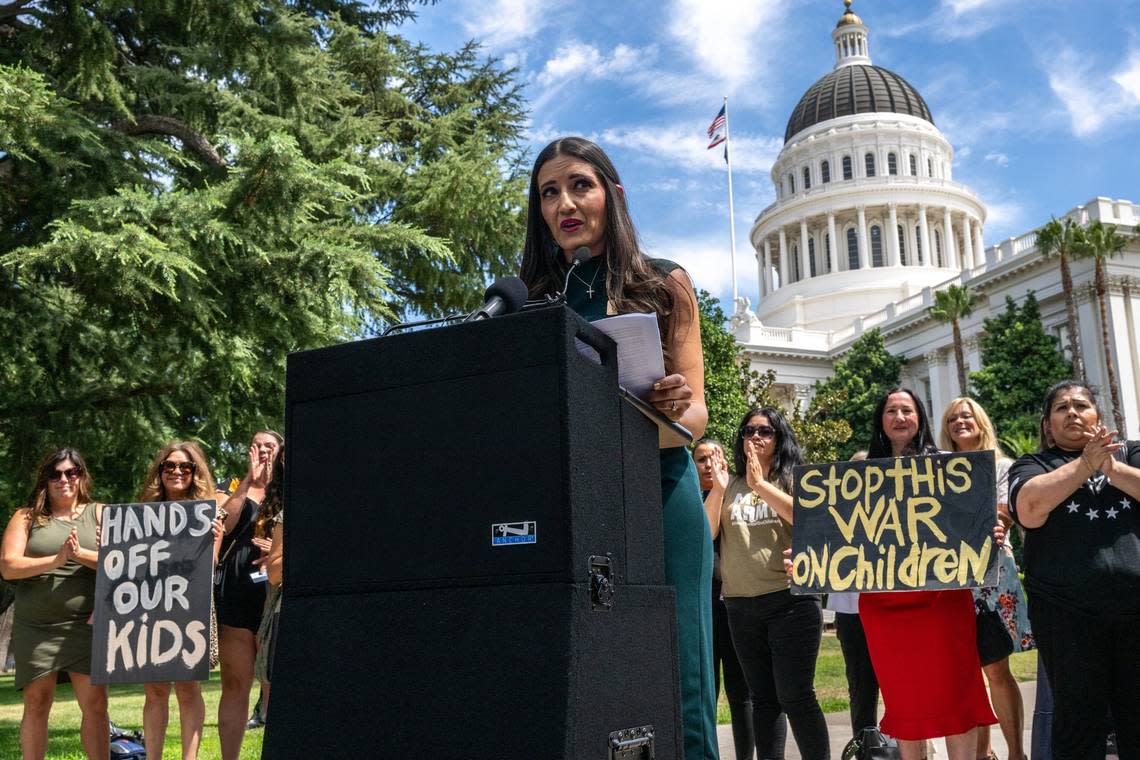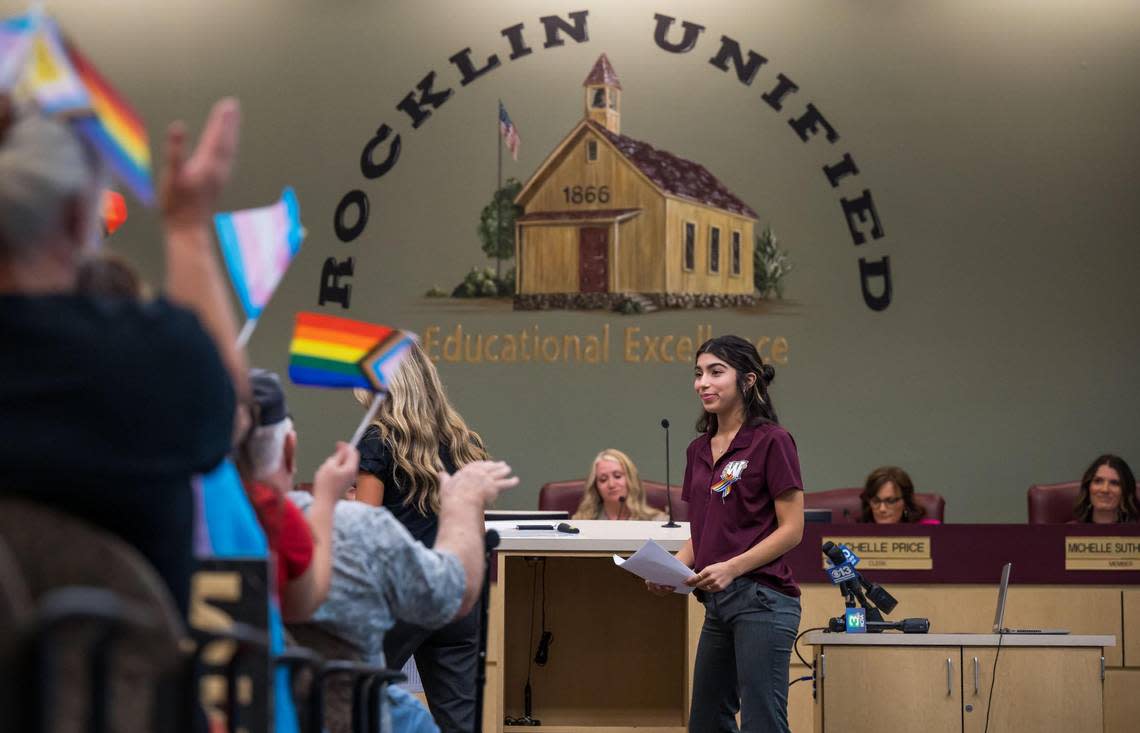Parental notification policies split opinions of California courts, Department of Education
Amid public outcry and school board meeting protests, the legal system seems to be working in favor of controversial parental notification policies across the state.
Several recent court rulings in Southern California have contradicted findings at the California Department of Education (CDE), which reported that a Placer County school district violated state Education Code with its parental notification policy, saying it discriminated against a protected group.
In Temecula, Chino, and Escondido, county and federal judges have sided with a vocal parents’ rights movement, allowing school districts to enforce such policies.
The CDE said it cannot comment on pending ligation and complaint investigations, but that the department “remains committed to supporting school boards and educators that create safe, welcoming, and inclusive learning environments in which all students can thrive.”
What are parental notification policies?
In short, parental notification policies require that school staff — teachers, counselors, administrators, and anyone else on campus — must inform a student’s parents if that student goes by a different name that does not align with their biological sex, uses different pronouns, or uses campus facilities that don’t align with their biological sex.
Parental notification policies began to spring up across California after Assemblyman Bill Essayli, R-Riverside, wrote a bill last year that would require school staff to inform a student’s parent if that staff member “becomes aware” that a student is identifying with a gender that does not align with their biological sex.
The bill failed to earn support among a Democratic supermajority in the legislature, but Essayli earned the support of organizers with the parents’ rights movement, who say parents should be informed if their child is experiencing something as serious as gender dysphoria.
The bill’s opponents, including most teachers as well as LGBTQ activists and allies, say that it is a “forced outing policy” that could threaten the safety of trans and nonbinary kids who don’t yet feel safe coming out at home. Teachers union members say it puts them in legally precarious waters where student privacy is concerned, and that if a student hasn’t told their parents about their gender dysphoria, it’s likely because it isn’t safe to do so.
After Essayli’s bill failed to pick up steam in the legislature, school boards took matters into their own hands.
Chino Valley Unified School District was the first to pass a parental notification policy in July 2023. The school district, located about 30 miles east of Los Angeles, drew national attention after voting to enact the policy. Attorney General Rob Bonta sued the district, and state Superintendent Tony Thurmond attended a board meeting in July where he faced off with board president Sonja Shaw, who had Thurmond removed from the meeting.

Other Southern California districts followed suit and passed similar measures, as did a small handful of districts in Placer and Shasta counties. The local Republican Party in El Dorado County has also brought the issue up at school board meetings.
Each parental notification policy is slightly different; for example, the Roseville Joint Union High School District passed a version of a parental notification policy last November that did not mention gender or gender identity, while the Rocklin Unified School District policy, passed in September, emphasized that school staff would only have to inform a parent if a student requested formal changes, but not if a staff member suspected a student to be trans, or heard from someone else that they were going by a different name.
California Courts v. Dept. of Education
The California Department of Education, headed by Thurmond — who is running to replace Gov. Gavin Newsom in 2026 — found that the Rocklin parental notification policy violated Section 220 of the state Education Code.
“No person shall be subjected to discrimination on the basis of disability, gender, gender identity, gender expression, nationality, race or ethnicity, religion, sexual orientation, or any other characteristic that is contained in the definition of hate crimes,” the Ed. Code reads. “Including immigration status, in any program or activity conducted by an educational institution that receives, or benefits from, state financial assistance, or enrolls pupils who receive state student financial aid.”
A Feb. 1 investigation report from the CDE said that the Rocklin policy “effectively singles out, applies to and only affects a particular group of students defined by legally protected characteristics.”

“The policy mandates that sensitive often private information, which is unique to a class of students with protected characteristics, must be disclosed by school administrators even if the student does not consent to the parent disclosure,” the report reads.
“This policy circumvents a student’s determination of when and where to share private personal information regarding gender identification and expression and it is required to be divulged without regard for the nuances of the relationship between the student and parent. These harms and risks of harm to the students, their constitutional rights of privacy and the protections afforded by California’s anti-discrimination policies are significant.”
But two superior court judges and one federal judge have sided with similar parental notification policies the CDE called discriminatory.
After Bonta filed a temporary restraining order against Chino Valley’s July policy, a San Bernardino County Superior Court judge barred the school district from implementing the policy as the case continues to be heard. The board voted on a revamped policy last month, which removes language about gender from the policy. Instead, it now requires school officials to inform parents within three days if a student requests to change any information in their official or unofficial record, including if the student changes their name to one that more aligns with their gender identity. The judge allowed the district to enforce this measure.
A school district in Temecula, which passed a parent notification policy as well as a policy restricting race and gender-related topics in August of last year, also received a favorable decision from a judge.
Riverside County Superior Court judge Eric Keen sided with a Temecula school district’s parental notification and curriculum policies in February.
The policy “does not expressly single out transgender or gender-nonconforming students, as it applies to any student’s request to change their school official or unofficial records,” Keen wrote in the decision.
Lastly, a federal judge in San Diego opposed an Escondido school district’s attempt to ban parental notification policies from the outset.
The school district had passed a measure that barred school staff from sharing any information about a student’s gender identity with their parents unless they had the student’s permission to do so. Two teachers in the district filed a lawsuit, saying the measure was a violation of their First Amendment rights.
U.S. District Court Judge Roger Benitez, who was appointed by former president George W. Bush and is known for blocking California’s many gun control measures, sided with the teachers last fall, and called parental involvement “essential to the healthy maturation of schoolchildren.”
Benitez has since ordered that the two teachers who sued the district over the privacy policy can go back to work. (They had been on paid administrative leave.)
Parents’ rights on the ballot
The issue is not just being fought in court and at school board meetings. Voters will have a say, too.
Protect Kids CA, a parents’ rights activist group, is collecting signatures for a ballot proposition in November, the Protect Kids of California Act, which would enforce a statewide parental notification policy, prevent trans kids from playing sports on teams that don’t align with their biological sex, and bar any trans minor from receiving gender-affirming health care, whether their parents support it or not. As the group collects signatures, they are also suing Bonta for what they call a mischaracterization of the initiative; Bonta’s office has titled it the “Restricts Rights of Transgender Youth” initiative.
In the meantime, voters appear to have supported the recall of parents’ rights school board members, which may indicate that the tide is turning on such board policies.
In Woodland, returns as of Tuesday afternoon show support for the recall of school board member Emily MacDonald; 62% of voters support her recall, the effort for which was launched after she voted against a PRIDE Month resolution and cautioned about the “social contagion” of “transgenderism.”
In Orange County, recall efforts for Rick Ledesma and Madison Miner, two conservative board members of the Orange Unified School District, are also getting support from voters. Per Orange County returns as of Tuesday afternoon, 53% of voters support both recalls, while 46% do not.
Ledesma and Miner both supported the parental notification policy the board passed in September. They also supported banning Pride flags, which they called “divisive.”
